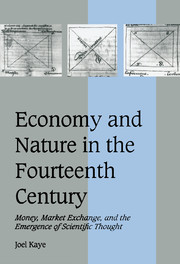 Economy and Nature in the Fourteenth Century
Economy and Nature in the Fourteenth Century Book contents
- Frontmatter
- Contents
- Acknowledgments
- INTRODUCTION
- 1 THE ECONOMIC BACKGROUND: MONETIZATION AND MONETARY CONSCIOUSNESS IN THE THIRTEENTH AND FOURTEENTH CENTURIES
- 2 THE ARISTOTELIAN MODEL OF MONEY AND ECONOMIC EXCHANGE
- 3 THE EARLIEST LATIN COMMENTARIES ON THE ARISTOTELIAN MODEL OF ECONOMIC EXCHANGE: ALBERTUS MAGNUS AND THOMAS AQUINAS
- 4 MODELS OF ECONOMIC EQUALITY AND EQUALIZATION IN THE THIRTEENTH CENTURY
- 5 EVOLVING MODELS OF MONEY AND MARKET EXCHANGE IN THE LATE THIRTEENTH AND FOURTEENTH CENTURIES
- 6 LINKING THE SCHOLASTIC MODEL OF MONEY AS MEASURE TO PROTO-SCIENTIFIC INNOVATIONS IN FOURTEENTH-CENTURY NATURAL PHILOSOPHY
- 7 LINKING SCHOLASTIC MODELS OF MONETIZED EXCHANGE TO INNOVATIONS IN FOURTEENTH-CENTURY MATHEMATICS AND NATURAL PHILOSOPHY
- Bibliography
- Index
- Cambridge Studies in Medieval Life and Thought Fourth series
6 - LINKING THE SCHOLASTIC MODEL OF MONEY AS MEASURE TO PROTO-SCIENTIFIC INNOVATIONS IN FOURTEENTH-CENTURY NATURAL PHILOSOPHY
Published online by Cambridge University Press: 16 July 2009
- Frontmatter
- Contents
- Acknowledgments
- INTRODUCTION
- 1 THE ECONOMIC BACKGROUND: MONETIZATION AND MONETARY CONSCIOUSNESS IN THE THIRTEENTH AND FOURTEENTH CENTURIES
- 2 THE ARISTOTELIAN MODEL OF MONEY AND ECONOMIC EXCHANGE
- 3 THE EARLIEST LATIN COMMENTARIES ON THE ARISTOTELIAN MODEL OF ECONOMIC EXCHANGE: ALBERTUS MAGNUS AND THOMAS AQUINAS
- 4 MODELS OF ECONOMIC EQUALITY AND EQUALIZATION IN THE THIRTEENTH CENTURY
- 5 EVOLVING MODELS OF MONEY AND MARKET EXCHANGE IN THE LATE THIRTEENTH AND FOURTEENTH CENTURIES
- 6 LINKING THE SCHOLASTIC MODEL OF MONEY AS MEASURE TO PROTO-SCIENTIFIC INNOVATIONS IN FOURTEENTH-CENTURY NATURAL PHILOSOPHY
- 7 LINKING SCHOLASTIC MODELS OF MONETIZED EXCHANGE TO INNOVATIONS IN FOURTEENTH-CENTURY MATHEMATICS AND NATURAL PHILOSOPHY
- Bibliography
- Index
- Cambridge Studies in Medieval Life and Thought Fourth series
Summary
A complex and dynamic vision of the natural world emerged within fourteenth-century natural philosophy and, with it, a cluster of logico-mathematical languages capable of describing and bringing order to this vision. Over the course of the century, the traditional image of a world of hierarchically fixed and absolute values began to dissolve, gradually replaced by a shifting, relational world in which values were in constant flux. As philosophers turned from the investigation of perfections and essences to the investigation of motion and change, questions of measurement and gradation came to dominate scholastic discourse. Since the pioneering work of Pierre Duhem in the early years of this century, historians of science have come to recognize the critical place this shift in philosophical concern played in the development of modern scientific thought. The concluding chapters of this book examine the many ways in which the intellectual process of scientific innovation was tied to the social experience of monetization and market development.
The suggestion that fourteenth-century philosophical speculation was influenced by social developments taking place in the society beyond the schools raises a number of questions. If natural philosophers were deeply involved in the world beyond the classroom and sensitive to its changes, why is the phenomenal world – including the world of social experience – so absent from their speculation? Why in the study of nature to empirical observations play a minuscule part within arguments dominated by technical logic?
- Type
- Chapter
- Information
- Economy and Nature in the Fourteenth CenturyMoney, Market Exchange, and the Emergence of Scientific Thought, pp. 163 - 199Publisher: Cambridge University PressPrint publication year: 1998


